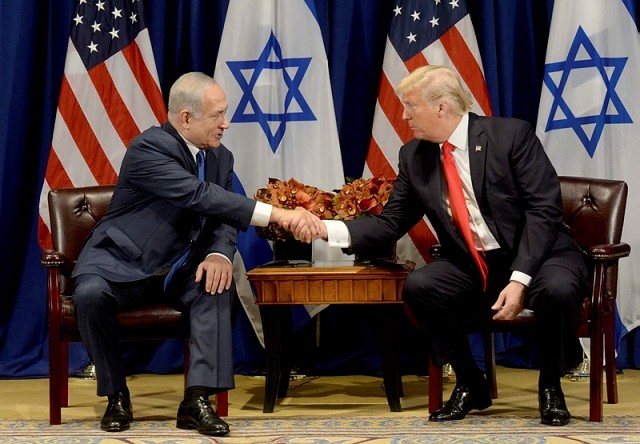Netanyahu and Trump will meet on the sidelines of the World Economic Forum, with the Iran nuclear deal expected to be their main focus.
By: Aryeh Savir, World Israel News
On Thursday, Prime Minister Benjamin Netanyahu and President Donald Trump will meet in Davos on the sidelines of the World Economic Forum (WEF). The two leaders are expected to discuss the latest development in the US and Israeli campaign to convince European leaders that the Iranian nuclear agreement must undergo major changes.
Before leaving for Davos on Tuesday, Netanyahu stated that “it was a great honor to host Vice President Mike Pence in Israel. He gave exceptional expression to the powerful relationship between Israel and the United States, and we’ll always remember his magnificent speech in the Knesset.”
Netanyahu will address the WEF, the most important economic forum in the world, and lecture on Israel’s economy.
“I will advance the standing of Israel which has already taken shape as a global technological power. This found expression in my visit to India last week. It will also take expression in my meetings with heads of state and heads of some of the largest companies in the world,” Netanyahu said.
“This will help us expand our diplomatic horizon, and our security and economic links, for the benefit of the economy, citizens and security of Israel,” he added.
Netanyahu is slated to meet with French President Emanuel Macron and German Chancellor Angela Merkel. Germany and France are parties to the 2015 Iran deal, an agreement that Trump has warned must be fixed or risk losing the US’ support.
Netanyahu stressed that in “the coming weeks they will have a last opportunity to try to introduce real – not cosmetic – changes in the dangerous nuclear agreement with Iran. In any case, with or without an agreement, our policy is to prevent the terrorist regime in Iran from arming itself with nuclear weapons, which would endanger us, the Middle East and the entire world.”
US Secretary of State Rex Tillerson is currently in Europe, seeking British and French support for tough new penalties against Iran to prevent a US withdrawal from the Iran nuclear deal.
Earlier this month, Trump pledged to stop waiving US sanctions unless the Europeans agreed to a stronger side deal that would effectively eliminate provisions that allow Iran to gradually resume its advanced atomic work.
Trump also wants tighter restrictions on Iran’s ballistic missile program.
Iran has rejected any renegotiation. Britain, France and Germany have expressed some willingness to work with the US to prevent the pact’s collapse by discussing measures that would supplement its conditions. The European Union’s high representative for foreign affairs, Frederica Mogherini, continues to oppose any actions that might infringe on the deal as it currently stands.
A US withdrawal would mean reimposing a broad range of sanctions that isolate Iran from the international financial system, effectively scrapping the agreement for all intents and purposes.
Iran has said it will no longer be bound by the terms of the deal if that happens.
Speaking from the Israeli president’s residence, which he visited on Tuesday, US Vice President Mike Pence urged European leaders to push for change in the Iranian nuclear deal, while threatening that Washington will quit the pact unless there are major changes.
Pence told reporters that Trump will never again sign the waiver against sanctions. “We are sending a signal to our European allies that the time has come for changes in the Iran nuclear deal that will ensure that the ‘sunset provisions’ in the deal are completely eliminated and that punitive sanctions will be available for many years to come, to prevent Iran from obtaining a nuclear weapon,” Pence warned.
The “sunset provisions” would allow Iran to “break out” and quickly build nuclear weapons as soon as the deal expires.


